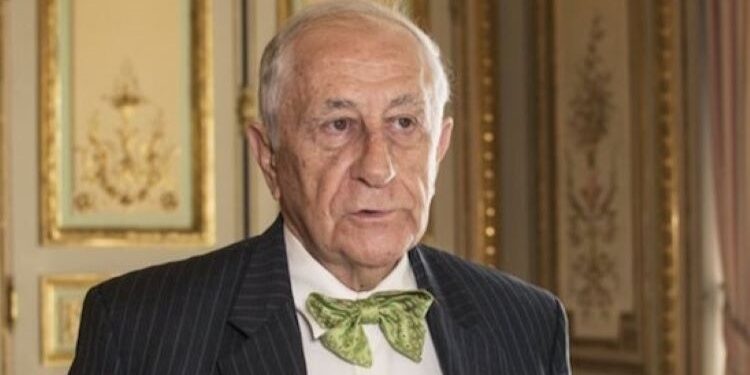Luis Ayllón
Fifteen retired Spanish ambassadors have issued a statement in which they express their rejection of the policy that the government of Pedro Sánchez has been maintaining with regard to Argentina and Israel, two countries which they describe as ‘friends’ and with which diplomatic crises have recently been opened.
The statement has been signed by diplomats who have been ambassadors or have held high positions, mostly with previous governments of the PP or the PSOE or both. In it, they point out that foreign policy is, par excellence, a state policy that ‘must be carried out,’ they say, ‘with the greatest possible consensus’ between the executive and the opposition parties. And they warn that this policy ‘must seek the general interest of Spain and not the particular interest of a party or an individual’.
Signing the document, entitled ‘Declaration on some aspects of Spanish foreign policy’, are the ambassadors: Inocencio Arias, José Ignacio Benavides, Manuel de la Cámara; Ignacio Camuñas; José Manuel Cervera, Javier Jiménez Ugarte; Juan Leña, Erik Martel, Ramón de Miguel, Arturo Pérez, Luis Guillermo Perinat; Juan Prat, José Ramon Remacha, Eloy Ibáñez and José Antonio Yturriaga.
The declaration includes the following thirteen points:
1.-Foreign policy is, par excellence, a state policy, which must be carried out – at least in its fundamental aspects – with the greatest possible consensus between the government and the opposition parties. This policy must seek the general interest of Spain and not the particular interest of a party or an individual.
2.- Although the President of the Republic of Argentina, Javier Milei, had been repeatedly offended by the Spanish Government, we reject his insulting comment about the wife of the President of the Government, made during his stay in Spain.
3.-We consider the reaction of the Government, whose Minister of Foreign Affairs, José Manuel Albares, announced the withdrawal ‘sine die’ of the Spanish Ambassador in Buenos Aires, to be disproportionate. We consider, however, that insults to a private individual are not an affront to national security and dignity, nor a frontal attack on democracy and the institutions of Spain.
4.-Spain maintains fraternal relations with Argentina, a country where almost half a million Spaniards live and where important Spanish companies operate, while in Spain there are also many Argentinean citizens and companies, who work for harmony, cooperation and the well-being of both peoples. The Spanish government has endangered them by the unjustified permanent withdrawal of its ambassador, which is unprecedented in the history of the two states.
5.-The Jews have formed an important part of the History of Spain and -despite their expulsion from the country at the end of the 15th century- the Sephardim have maintained throughout the centuries the Spanish language, culture and traditions, with the help of the Consulate General of Spain in Jerusalem since 1856. The Jewish people have been victims of genocide by the German Nazi regime during the 20th century, through a holocaust that caused the extermination of millions of people.
6. After the creation of the State of Israel in 1947 and the subsequent warfare between Israelis and Arabs, Israeli troops occupied Gaza and most of the West Bank, and its government has not allowed the Palestinian people to exercise their legitimate right to self-determination.
7. Since establishing diplomatic relations in 1986, Spain and Israel have pursued a friendly policy of cooperation, which has recently been called into question by the inappropriate behaviour of the two governments.
8. On 7 October 2023, the Hamas terrorist movement – which rules in Gaza – carried out a brutal attack inside Israel in which its members murdered some 1,200 Israelis and kidnapped a hundred citizens, in what amounted to a qualified act of genocide. In the exercise of its right to legitimate self-defence, Israel attacked Gaza, but it is doing so disproportionately and in violation of the rules of international and humanitarian law, causing more than 30,000 deaths.
9. Although this action is condemnable, it does not justify the fact that the Vice-President of the Government, Teresa Ribera, and the Minister of Defence, Margarita Robles, have accused Israel of committing acts of genocide, and that the Vice-President, Yolanda Díaz, and several ministers have adopted the postulates of Hamas and advocated the recognition of a Palestinian state from the Jordan River to the Mediterranean Sea, which would imply the destruction of Israel.
10. The Israeli government has reacted disproportionately to the Spanish government’s recognition of the Palestinian state, with Foreign Minister Israel Katz accusing it of encouraging the genocide of the Jewish people and taking retaliatory measures, such as threatening to close the Spanish Consulate General in Jerusalem.
11. Hamas and Israel have acted in an execrable manner, as has Iran, which has attacked Israel through its protégés Hamas, Hezbollah and the Houthi militias.
12. It is imperative and urgent that a ceasefire be adopted in Gaza, as proposed by the UN General Assembly, but which could not be agreed in the Security Council because of the US veto. The Israeli prime minister, Benjamin Netanyahu – who has been denounced by the attorney general of the International Criminal Court for war crimes and crimes against humanity – has ignored the International Court of Justice’s order for an immediate halt to the attacks on Rafah, and the situation in the city is becoming more dire by the day.
13. The Spanish government has not lived up to its responsibilities, neither in the serious armed conflict in Gaza between Israel and Hamas, nor in the non-existent conflict between Spain and Argentina.
The ambassadors conclude by stating: ‘As people who have given a good part of our lives in the service of the state, we call on the government to adopt an attitude in accordance with its historical responsibility and the general interest of Spain’.







